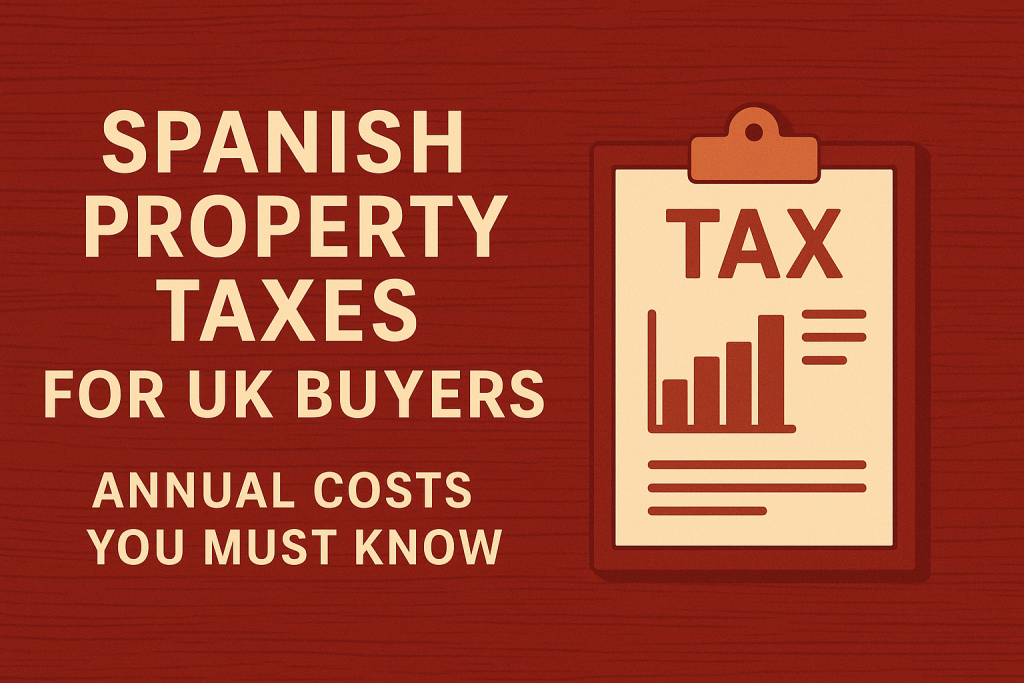
Buying a property in Spain is an exciting step, whether it’s a holiday home on the Costa del Sol, a long-term investment, or your future retirement home. But many UK buyers are often surprised to discover that owning property in Spain comes with annual taxes that must be paid to the Spanish authorities.
Understanding these taxes is essential to avoid penalties and to plan your budget correctly. In this guide, we’ll explain the main Spanish property taxes for non-residents, how they are calculated, and what UK citizens need to know.
IBI Tax
The acronym “IBI” stands for “Impuesto sobre Bienes Inmuebles”, or Tax on the Real Estate. It is the annual local property tax from which City Councils obtain the majority of their funds, and affects all real estate. Here are the keys:
- It is paid to the local Town Hall (Ayuntamiento) of the municipality where the property is located.
- The amount is calculated based on the cadastral value (valor catastral) of the property, not its market value. This is important as the cadastral value is usually much lower than the market value.
- Rates usually range between 0.4% and 1.1% of the cadastral value for the urban real estate, depending on the municipality.
For example: if the cadastral value of your Spanish property is €100,000, the IBI might be between €400 and €1,100 per year.
Garbage Collection Fees
In addition to IBI, most municipalities charge an annual fee for rubbish collection. The payment of this fees is usually divided in various installments (usually one per semester).
- Amounts vary greatly depending on the area, but are often in the range of €100 – €250 per year.
Non-Resident Income Tax (IRNR)
If you are a non-resident who owns property in Spain, you must pay Non-Resident Income Tax (IRNR), even if you do not rent out your property. This usually surprises foreign people as one would think that if you are not making profits out of your property, you shall not pay income taxes. But in Spain, the government, presumably in an attempt to compensate for those who are making profits and not declaring them, charge the non-resident income tax to all non-residents who are supposedly not renting their properties, basing the calculation of the tax on an estimated amount of the profits they could be making.
For this tax, there are two different scenarios:
- If you rent the property out: You must declare the rental income periodically and pay tax on it.
- If you do not rent it out: The Spanish government still imputes a “theoretical” income, assuming you could be making money by renting. You must pay tax yearly on that imputed income.
Rates for non-EU residents (including UK citizens post-Brexit) are 24%, while for EU residents are 19%.
Wealth Tax in Spain: Do UK Citizens Have to Pay It?
Spain also has a Wealth Tax (Impuesto sobre el Patrimonio), but it only applies if your total assets in Spain exceed certain thresholds.
- In most regions, the threshold is €700,000 (excluding €300,000 for your main residence if you are a tax resident).
- Some regions, such as Andalusia and Madrid, apply reductions or exemptions.
For many British second-home owners, this tax will not apply, but it is important to check with a lawyer on a case by case basis.
Differences Between Residents and Non-Residents
- Residents in Spain: Must declare their worldwide income and assets to the Spanish tax authorities.
- Non-residents (UK buyers who only own property): Only pay taxes related to their Spanish property (IBI, garbage collection, IRNR, and possibly Wealth Tax).
How to Pay Property Taxes in Spain as a UK Citizen
The most convenient way to handle the taxes we explained in this post, is by setting up an automatic direct debit with the bank account of your choice. This will be the option to go for in the case of local taxes and fees. But will not be possible for the non-resident income tax, since that one requires the tax payer to make a declaration for each case, so you won’t be able to just set up the direct debit and forget about it. For that reason, we recommend to look for the assistance of a professional in this case. Appointing a lawyer or fiscal representative in Spain to manage these taxes on your behalf will make your life easier, and avoid paying fines for late declarations, etc.
Final Word: Plan Ahead for Spanish Property Taxes
When budgeting for your Spanish property, remember that it’s not just the purchase costs that matter, there are ongoing annual taxes that you must pay to keep everything in order.
As a general rule, set aside at least 1% of your property’s value each year for local taxes and maintenance.
If you are a UK buyer who already owns or is considering buying a property in Spain, having a trusted bilingual lawyer will ensure that you understand your obligations, pay the correct amount, and avoid penalties.
Contact our law firm today for a free consultation and let us help you manage your Spanish property taxes safely and efficiently.
Need help? Contact us for a free initial consultation!
Your first step is 100% risk-free:
- No obligation to proceed
- First consultation completely free
- Qualified Spanish lawyers only
- Clear, personalised legal advice
- All fees disclosed upfront
- 100% remote process, no travel needed
